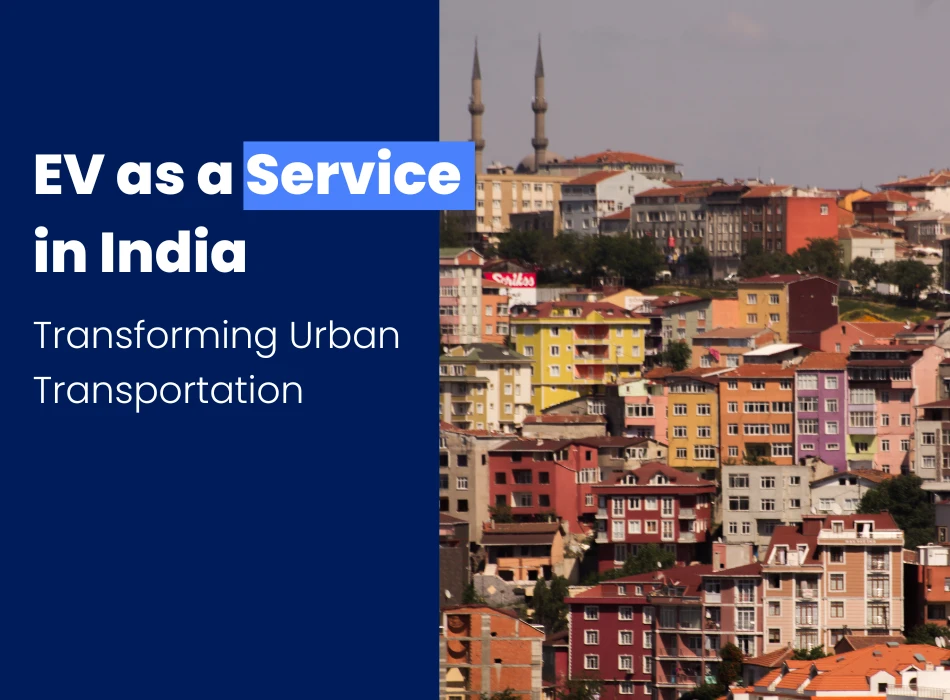EV as a Service in India: Transforming Urban Transportation
Explore how Electric Vehicle as a Service (EVaaS) is transforming urban transportation in India by offering sustainable, flexible, and cost-effective mobility solutions.

Understanding Urban Transportation
Urban transportation refers to the systems and modes of transport that facilitate the movement of people and goods within densely populated areas. This includes various forms of transport, such as public transit (buses, subways), private vehicles (cars, motorcycles), and non-motorized options (walking, cycling). Effective urban transportation is crucial for economic development, social interaction, and overall quality of life in cities.
As urban populations grow, the demand for efficient transportation increases. However, this also leads to challenges such as traffic congestion, pollution, and inadequate infrastructure. Addressing these issues is essential for creating sustainable urban environments that can support future growth.
Current State of EVaaS in India
The Electric Vehicle as a Service (EVaaS) sector in India is in its nascent stages but is rapidly gaining traction. Major players include companies like MyTVS, Zypp Electric, and Fyn Mobility, which focus on electrifying fleets for e-commerce and logistics. These companies primarily offer two-wheelers and three-wheelers, which are the most commonly used vehicles in urban areas due to their maneuverability and lower operational costs.
Investments in this sector have surged, with over $160 million funneled into electric vehicle startups since April 2020. This influx of capital reflects a growing recognition of the economic and environmental benefits associated with electric mobility. E-commerce giants like Amazon and Flipkart are also making significant commitments to electrify their delivery fleets, aiming for thousands of electric vehicles by 2025 and 2030, respectively.
How EVaaS Transforms Urban Transportation
- Reducing Traffic Congestion
EVaaS promotes shared mobility solutions that help reduce the number of vehicles on the road. By providing access to electric vehicles through subscription or leasing models, more people can opt for shared rides instead of individual car ownership. This alleviates congestion during peak hours and enhances overall traffic flow. - Enhancing Environmental Sustainability
Urban transportation is a significant contributor to air pollution. By encouraging the use of electric vehicles, EVaaS helps cities reduce their carbon footprint. The shift towards electric mobility aligns with global sustainability goals and contributes to cleaner air quality in urban areas. - Promoting Flexible Mobility Solutions
EVaaS offers flexibility that traditional transportation models lack. Users can choose from various electric vehicles based on their needs—whether it’s a compact car for daily commuting or an electric scooter for quick errands. This adaptability meets the diverse demands of urban residents. - Cost-Effectiveness for Users
The financial burden of owning a vehicle can be significant due to maintenance costs, insurance, fuel prices, and depreciation. EVaaS reduces these costs by allowing users to pay only for what they need when they need it. - Improving Public Transit Integration
EVaaS can complement existing public transportation systems by providing last-mile connectivity solutions. Users can take public transit to a central location and then use an electric vehicle from an EVaaS provider to reach their final destination. - Encouraging Infrastructure Development
The growth of EVaaS necessitates the expansion of charging infrastructure across urban areas. As more companies invest in electric fleets, cities will benefit from improved infrastructure that supports electric vehicles and enhances overall urban mobility.
Benefits for Businesses
Beyond cost savings, EVaaS offers several advantages for businesses:
- Improved Brand Image: Companies adopting sustainable practices enhance their reputation among environmentally conscious consumers.
- Increased Employee Productivity: Providing modern mobility solutions can improve employee morale and job satisfaction.
- Simplified Fleet Management: With platforms offering end-to-end management solutions, businesses can streamline operations without the complexities of vehicle ownership.
Challenges of EVaaS Adoption
Despite its benefits, several challenges hinder widespread adoption:
- Limited Charging Infrastructure: The lack of a robust charging network remains a significant barrier to EV adoption.
- Higher Upfront Costs: Although EVaaS reduces ownership costs, service providers may face higher initial expenses related to vehicle procurement and infrastructure development.
- Lack of Awareness: Many consumers are still unaware of the benefits and availability of EVaaS options.
Future Outlook
The future outlook for EVaaS in India is promising. Government initiatives like FAME II aim to accelerate the adoption of electric mobility through subsidies and infrastructure support. Additionally, emerging trends such as advancements in battery technology and increased investment in charging networks could further catalyze growth in this sector.
As urbanization continues to rise in India, embracing EVaaS will play a crucial role in creating sustainable urban transportation solutions that benefit both individuals and businesses alike. The future is indeed bright for electric mobility!
Conclusion
In conclusion, Electric Vehicle as a Service is set to transform urban transportation in India by providing sustainable, flexible, and cost-effective mobility solutions. By addressing key challenges such as traffic congestion and environmental impact while promoting innovative transportation models, EVaaS represents a significant step forward in creating smarter cities. Embracing this model not only contributes to personal convenience but also plays a crucial role in building greener urban environments for future generations.